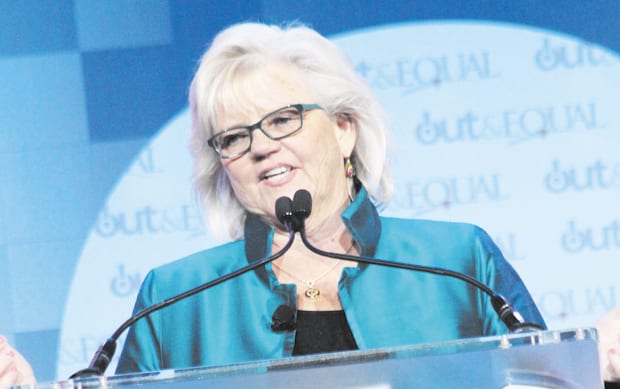Founder Selisse Berry sees global issues as the next step for LGBT employee groups to tackle
DAVID TAFFET | Senior Staff Writer
Now that marriage equality is the law in the U.S., some companies are eliminating partner benefits. But Out & Equal founder Selisse Berry warns: Not so fast.
“People are being assigned in scary parts of the world,” she said, explaining that marriage equality in the U.S. does not necessarily mean that those marriages are safe elsewhere.
Many of the companies attending this week’s Out & Equal Workplace Summit are multinational corporations that transfer employees around the world. Not every place is safe for a same-sex couple.
Berry said in some cases it’s best for someone not to have a marriage to a same-sex spouse on file anywhere. But that employee’s partner may still need health insurance.
In the U.S., one partner may work for an oil company in Texas or Oklahoma that offers partner benefits and the other is a school teacher. Major cities in both states may protect their teachers, but smaller districts don’t.
Berry said that because a marriage license is public record, it may still be better for some couples to remain unmarried to protect their jobs.
“You can still get married one day and be fired the next in 28 states,” she stressed.
Berry lived in Dallas before moving to San Francisco to become a Presbyterian minister, where, she said, she finally came to terms with being a lesbian and came out.
“The Presbyterian Church didn’t share my joy,” she said. “The people who taught me to value the truth were now telling me to hide it.”
Before founding Out & Equal, Berry founded another organization called Seminary Lesbians Under Theological Stress or SLUTS. She founded Out & Equal 19 years ago but it took two years before they were ready to stage the first Workplace Summit.
Addressing the issues
While Out & Equal focuses on specific anti-LGBT discrimination, sexual orientation and gender identity issues can play a role in other instances of bias seemingly not related to sexual orientation or gender identity.
For example, a French employee who works for an American corporation said he’s perceived as lazy by his American supervisors because he takes the vacation he’s entitled to take by French law. His American supervisors assume he takes all that time off because he’s gay and simply irresponsible.
In another case, an employee from an Indian affiliate said he’s not given responsibility because he’s perceived as not understanding instructions or a specific situation because of his accent. Add his sexual orientation into the mix and that gives his coworkers and supervisors just another reason why they can’t relate to him.
In other words, American supervisors and coworkers who don’t understand the culture of coworkers or employers from other parts of the world can add their own anti-LGBT bias to an already stressful relationship.
Out & Equal is addressing those workplace issues around the world with affiliate organizations in other countries and global partner programs.
A Bangalore conference attracted 40 people from six companies to discuss LGBT workplace issues. The event happened a week after India’s Supreme Court reinstated the criminalization of sexual activities “against the order of nature,” including same-sex relationships.
The meeting between companies was to share best practices within the context of Indian law. While American companies adjust to changes in law after marriage equality for their employees in this country, they must deal with those same employees, who may be transferred overseas where they suddenly are considered criminals.
Berry said Out & Equal affiliates in other countries have developed “organically.” The Bangalore conference began with one of her board members who travels to India on business.
When an Italian employee was transferred back home after working in London with a company that offered nondiscrimination policies and partner benefits, he founded an organization called Parks, in honor of Rosa Parks, and has since been elected to the Italian Parliament where he continues to work for LGBT rights.
Brazil, Mexico and Denmark also have Out & Equal affiliates.
“They’re at different stages of their journey,” Berry said.
Berry has seen participation grow, with new companies attending the conference each year. Some send three people the first time, she said, 10 the next and within a few years they’re attending with their CEO and dozens of employees.
Disney, which won this year’s award for its historic and ongoing commitment to LGBT equality, was represented by its vice president of human resources and about 50 employees from the theme parks, ABC, ESPN and other divisions.
Johnson & Johnson won the Outie Award for best employee resource group and also had more than 50 employees in attendance to pick up their award.
At this week’s conference, Out & Equal released a new best practices guide for transitioning in the workplace. The 27-page document called
“Workplace Gender and Transition Guidelines” includes everything from specific company policies that should be in place to planning, confidentiality and the role senior management can take.
Among the issues addressed are how to deal with co-worker and customer concerns.
“Customer preference is not a reason to deny an employee the right to dress consistently with their gender identity,” the guidelines advise.
Dallas’ Oliver Blumer is among the Out & Equal transgender advisory committee’s members who helped compile the guidelines that Berry said took several years of research.
Berry said the guidelines resulted from requests from Fortune 500 CEOs looking for best practices for their companies to implement. As this guideline is used by more companies and experiences shared, it will be updated with new ideas.
This article appeared in the Dallas Voice print edition October 9, 2015.


